- Eating Windows vs. Fasting Windows
- What Can You Drink During Intermittent Fasting?
- 5 Drinks That Won't Break A Fast
- Are There Drinks You Should Avoid During Intermittent Fasting?
- 4 Drinks That Will Break A Fast
- Recap: What’s Allowed During Intermittent Fasting
- Common Concerns About Intermittent Fasting
- Final thoughts
- Eating or drinking anything that contains calories will break a fast. Calories should be consumed during your eating window.
- You can (and should!) definitely drink water during intermittent fasting. If you prefer lemon water, you can also add a slice of lemon to your water.
- You should avoid drinking diet sodas during your fasting windows because study results are mixed on how artificial sweeteners would impact insulin levels.
Intermittent fasting holds the potential for a myriad of health benefits, all without counting calories or hours of preparation. No wonder so many people have been trying (and raving about) it!
Despite what it might sound like, intermittent fasting is NOT about starving yourself. It’s more about when you eat, than how much you eat.
So what exactly can you consume while following an intermittent fasting plan? And are there drinks that can make it easier or more effective?
We wanted to get to the bottom of that question, and here’s what we discovered: there are entirely different guidelines for what you can eat and drink to get the most out of intermittent fasting. And it all depends on whether you’re in your eating window or your fasting window.
Eating Windows vs. Fasting Windows
Intermittent fasting is an eating pattern that breaks your day into two parts:
- Eating (or feeding) windows, and
- Fasting windows (not eating)
There are actually a variety of intermittent fasting schedules you can follow to determine what hours of the day these windows actually include. We have a handy guide to fasting schedules for you to check out here.
The most common schedule is the 16/8 plan, which means you eat for an 8-hour window and fast for 16 hours. You can also choose to do shorter or longer eating windows, or even opt for alternate-day fasting.
If you’re new to this way of eating and need help getting started, definitely check out our Beginner’s Guide to Intermittent Fasting.
During your fasting period, you want to refrain from consuming any food or beverages that contain calories. So….. no food. But you have several beverage options, and these are important because it is critical to keep yourself hydrated while fasting.
What Can You Drink During Intermittent Fasting?
Beverages can be a life-saver when it comes to fighting off hunger pangs and cravings during your fasting windows. There are even certain drinks that can help enhance the benefits of your intermittent fasting plan. Sweet!
5 Drinks That Won’t Break A Fast
- Water
- Coffee
- Bone Broth
- Tea
- Apple Cider Vinegar
1. Water
You can (and should!) definitely drink water during your fasting windows. Water is always a great choice, all day long, every day. It can be still or sparkling, whatever you enjoy. If you prefer lemon water, you can also add a squeeze of lemon (or lime) to your water. For other fun flavor variations, try infusing a pitcher of water with cucumber or orange slices.
But make sure you stay away from any artificially-sweetened water enhancers (like Crystal Light). It is unclear how sweetener could interfere with your fast!
2. Coffee
Black coffee is a calorie-free beverage that doesn’t affect insulin levels. You can drink regular coffee (caffeinated) or decaf coffee during fasting windows, just don’t add any sweetener or milk. Spices like cinnamon are totally fine!
Many coffee-drinkers enjoy a cup of joe, or even espresso, during fasting windows with no adverse effects. But some people experience a racing heart or upset stomach if they drink coffee during fasting windows, so monitor your own experience.
Bonus: black coffee might actually enhance some of the benefits of intermittent fasting, and it’s quite popular with people who also follow a keto diet. This study demonstrated that taking in caffeine seems to support ketone production. Coffee has also been shown to support healthy blood sugar levels over the long term. (1)
3. Bone Broth
Bone broth (or vegetable broth) is recommended for any time you decide to fast for 24 hours or more. While it has calories, it does not contain any carbohydrate, so it helps you stay in ketosis.
A good homemade broth, or one made by a trusted source, is the way to go.
4. Tea
Help increase your satiety naturally with tea! It just might be the secret weapon that, not only makes your fasting plan easier but also more successful. Read our primer on how to use tea to enhance your intermittent fasting plan.
All types of tea are great to drink during a fast, including green, black, oolong and herbal teas. Tea boosts the effectiveness of intermittent fasting by supporting gut health, probiotic balance, and cellular health. (2)
Green tea, in particular, has been proven to help increase satiety and support healthy weight management. (3) Here’s the green tea we recommend:
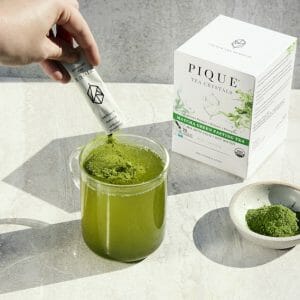
Pique Matcha Green Fasting Tea
Featuring the world’s best ceremonial grade matcha. Secret weapon to conquer the mental challenge of fasting. A mug full of zen.
5. Apple Cider Vinegar
ACV seems to help to support healthy blood sugar and digestion. It may even enhance the effects of your intermittent fasting plan!
If you aren’t a fan of the apple cider vinegar drink, try it as salad dressing during eating windows. It’s good for you any time of the day!
Are There Drinks You Should Avoid During Intermittent Fasting?
There are a few beverages (including “zero-calorie” ones) that you might not realize are capable of “breaking your fast.” This means that if you consume these, you will knock your body out of the “fasted state.”
If you’re wondering whether common beverages, like diet soda, almond milk, coconut water, or alcohol will break your fast, we found the answers:
4 Drinks That Break A Fast
- Diet Soda
- Almond Milk
- Coconut Water
- Alcohol
Can You Drink Diet Soda While Intermittent Fasting?
Even though diet soda is technically free of calories, it’s unclear how artificial sweeteners may impact fasting.
Can You Almond Milk While Intermittent Fasting? What about Coconut Water?
Almond milk and coconut water both tend to be very high in sugar. Sugar equals carbs, so as soon as you consume these, you are no longer considered to be fasting. You want to avoid drinking these during fasting windows.
Can You Drink Alcohol While Intermittent Fasting?
On intermittent fasting days, it’s best to limit alcohol consumption to your eating windows. Most alcoholic beverages are high in sugar and calories, so drinking alcohol can easily break your fast. Plus, alcohol affects us more on an empty stomach, so even one glass of wine during a fasting window might feel awful the next day!
Recap: What’s Allowed During Intermittent Fasting
Generally speaking, consuming any form of calories will break a fast. Therefore, no food is allowed during your fasting window. However, there are many non-caloric beverages that you can enjoy while intermittent fasting like black coffee, tea, water, and lemon water.
Common Concerns About Intermittent Fasting
Sometimes the transition to an intermittent fasting lifestyle can lead to a couple weeks of symptoms like headaches, hunger and muscle cramps. These are pretty normal for your initial adjustment period. We have a few suggestions to help you out in the infographic below.

Final Thoughts
So many diets fail because they’re complicated or too difficult to follow. The popularity and success of intermittent fasting are attributable to the fact that it is incredibly simple. Follow these basic guidelines of what to drink to best support your fasting schedule, and you should be well on your way to reaping the amazing benefits of fasting. Good luck!
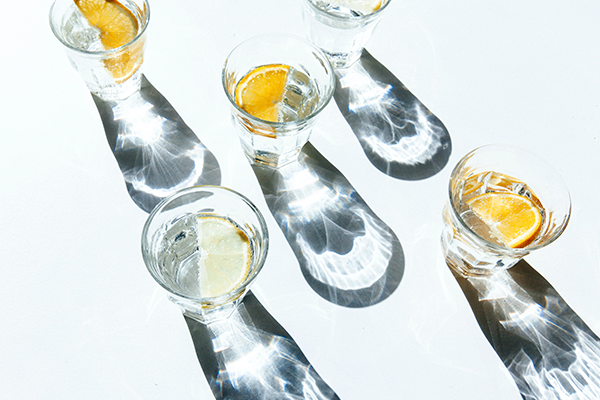

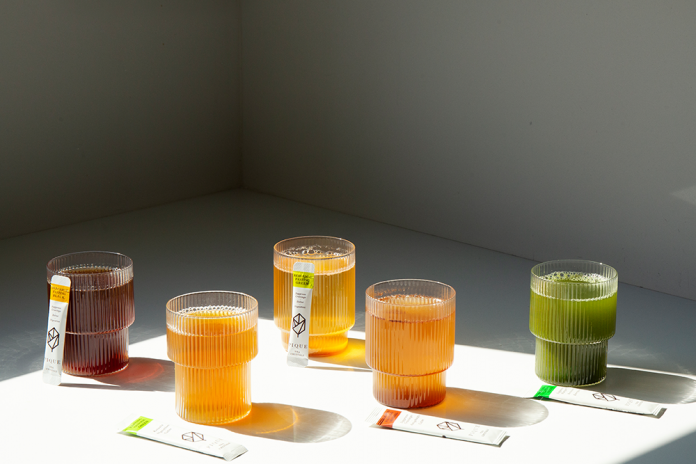
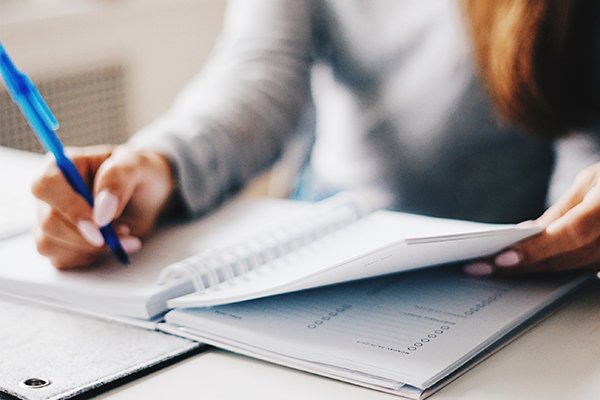
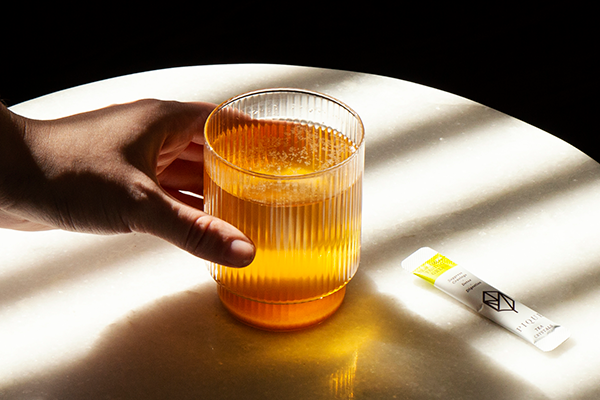
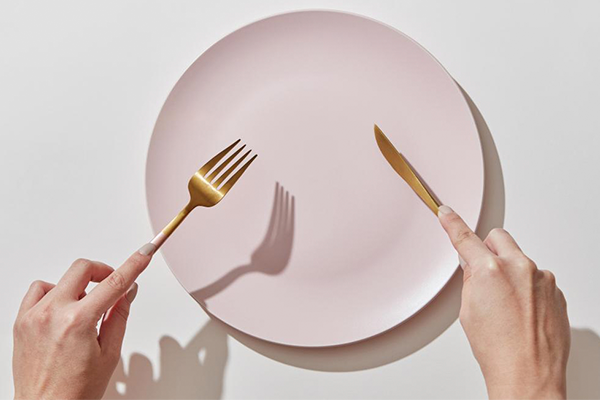
Dead wrong about increasing fiber if constipated – which bulks up stools and makes it worse. Read Fiber Menace.
What do you suggest for constipation then?
I suggest reading the book Fiber Menace but in the mean time if a person has switched to a ketogenic diet and become constipsted it is likely because they were fiber dependent due to low potassium and sodium.
The solution therefore would be to increase sodium and potassium. The essiest way to increase sodium is to drink bouillon or bone broth. I purchased chicken snd beef bouillon in individual packets which provide approximately 900 mg of sodium per packet. I found that two per day in addition to salting my food to taste really helped. Potassium is a little more difficult but there are electrolyte drinks or use salt free replacement ‘salt’ which is potassium.
There are more reasons to have constipation and solutions which the book covers. It is not an overnight fix as many believe.
If there is not so much fiber going in, then there’s not much to come out. As long as you are feeling ok, and bowel movements, when they do occur are relatively easy and painless, then there’s nothing to worry about. I went from a once a day kind of person, to 2 – 3 times week on keto. Saving money on toilet paper and feeling fine. Its a new kind of normal. I assume higher fat levels and plenty of water should keep things running smoothly.
Dead wrong about increasing fiber if constipated – which bulks up stools and makes it worse. Read Fiber Menace.
Dizziness is a sure sign of low BP if on a ketogenic diet and taking high blood pressure meds but BP drops due to low carb. See you doctor before going on a ketogenic diet and monitor BP..
Excellent. That’s for sure. It happened to me big time. My BP dropped so low trying KETO previously I had to stop taking my meds as I had gone into Low BP.
Dizziness can be caused by screwed up electrolytes. I needed an electrolyte supplement. I use Dr. Berg’s and Black Cherry ZipFizz, but there are others out there.
Usually get muscle cramps firs if electrolytes are lowt. Bone broth or bouillon cubes as Dr. Phinney says as well. Never tried ZipFizz. No sodium, but adds potassium and magnesium. I wouldn’t want the 100 mg of caffeine though.
Some of these suggestions like drinking broth, apple cider or adding lemon to water, etc I would think would knock you off the fast mode and kick the food metabolism processes into action since they have calories and contain substances that body must processmetabolize, same as when eating a dehydrated apple, lemon, coffee bean etc
Gin Stephens, a former teacher of gifted students, wrote “Delay Don’t Deny” and in her book and her Facebook groups she recommends a “Clean fast”, meaning plain water and/or black coffee or plain tea, and nothing else, except perhaps a little salt when indicated. The before and after photos in her FB groups are jawdropping. There is no diet dogma allowed in those groups – it is a come one, come all approach to intermittent fasting.
Mr. Hand, I disagree with some of your assumptions. While food or food products like dehydrated apples, broths, or lemon can cause the food metabolism processes to kick-in, ingesting such non-food products as black coffee and apple cider vinegar do not interfere with the intermittent fasting benefits. On the contrary, they can enhance the benefits of fasting. The key is that fasting causes AMP-activated kinase (“AMPK”), and such substances as coffee and apple cider vinegar promote AMPK activation. See this study, for example, on the benefits of apple cider vinegar to AMPK activation: https://www.ncbi.nlm.nih.gov/pmc/articles/PMC4039279/. And here’s study showing the benefits of black coffee on AMPK activation: https://www.ncbi.nlm.nih.gov/pmc/articles/PMC4632959/. Many in the scientific community who are researching the benefits of fasting and ingesting such common and relatively cheap substances such as coffee and apple cider vinegar believe that those practices can extend lifespans because of the AMPK activiation effect. The relatively cheap prescription drug Metformin also enhances AMPK activation. See this study: https://www.ncbi.nlm.nih.gov/pmc/articles/PMC209533/.
I am surprised that stevia is allowed in your coffee when fasting. I thought all sweeteners were discouraged whether fasting or eating…?
Contrary to what is claimed in the article above most artificial sweeteners have zero effect on insulin response . The few that do are the sugar alcohol based sweeteners such as Maltitol which will give an insulin response almost as high as real sugar
I also found the information on sweeteners to be confusing.
Hi All! Can anyone share the serving sizes that they’re referring to – please? Thanks much.
I have to say after reading the list of drinks that are allowed during a fast; I agree with the majority of them. However, broths of any kind should not be consumed during a fast as it will need to be “broken” down within the body which will trigger an insulin reaction and will break a fast. Coffee, tea, water, and apple cider vinegar do not go through this same process and therefore do not disrupt the fasting period
That was confusing! No artificial sweeteners allowed, but Stevia is ok? Stevia is an artificial sweetener. So is it allowed or not? Maybe its not artificial and so its ok? And what about monk fruit and erythritol? I was also confused about almond milk, unsweetened almond milk is one of the best milks for a keto diet because its low carb (low sugar) but this article says its high in sugar? Not that I would drink it while fasting, but it was still confusing. Why do diet sodas break a fast if there are no calories? A little more information about this is needed I think.
Stevia is a natural sweetener not artificial, it’s sugar substitute that does not have any impact on your blood sugar and is a zero on the glycemic index.